A Treble’s Song
Is there a thing to match a treble’s song?
The joy perhaps of spring-time larks in flight,
Or how the migrant birds so deftly throng?
What of the mane that speaks the lion’s might?
The gentle rain that tempers summer’s drought,
Or breeze to soothe its heat, however slight?
How could the essence of a basil sprout
Delight as much the tender means of smell?
Not very well—is there the slightest doubt?
Not so: a treble’s voice will always tell
The vibrant heart: it does not take us long
To sing and reach the realm where angels dwell.
The Last Laugh
One day, alone, I set out on a stroll;
I went to listen to my saddened mind
In hopes of finding wisdom of some kind
That would for once refresh my restless soul.
I wished to find my cheer that someone stole
—That time when I felt overly maligned—
When those, my sorry friends, left me behind
Much like a car will swerve around a hole.
No matter though. I knew my respite near:
Well powered by a solid inner base
I vitalized my will to persevere
And found my old laconic happy face.
For as I will be smiling in my bier,
He who laughs last will win this silly race!
Exigency
At times some people—say at middle age—
Receive a sense of a productive day
That’s often followed by an urgent stage
Of barely realized but dark dismay.
Whereas we should feel happy with what’s done,
We cannot always reach that point. We’re scared:
We feel we’ve lost control, “the-rival-won,”
And sense our fragile pathos much impaired.
It is a wretched premonition that,
Essentially, the end of life is near
And all our well intended plans fall flat:
“‘Twas all for nothing, that much now seems clear.”
Ah, mortal one, did you not know your maker,
Who works in ways that far surpass your grasp,
That he’s your mover and your loving shaker
Whose sovereign ways and means can make you gasp?
And what’s for you still more important yet:
His constant aim has been to bring you home,
All safe and sound, untouched by any threat,
Sustained by power as of an astral poem.
My Friend Elsa
Once when I was still young and curious
I got employment working at a zoo.
The fun and thrills grew fast and furious
Until my wits and understanding grew.
I learned to see the animals as people,
Each with his very own aspects and quirks
And some behave (like people) just like sheeple,
While others often act like great big jerks.
We anxious workers were assigned “our” charges:
I got three zebras, a hippo and baboon,
But if you really want to know what large is,
My favored friend was born in Cameroon.
A gorgeous female elephant it was
And she and I became the best of friends.
We understood each other well, because
With love our difference in kind amends.
At times she offered me a little ride
Upon her trunk, ‘t was granted, never asked.
Or walked, content, with me close by her side;
The fun we had was wondrous, unsurpassed.
One time, when walking to her stall with glee
There was not room for us to enter in.
At once she stopped, to keep from crushing me
And thus prevented hurt and broken skin.
We kept the same (unspoken) comport rules;
Except for her overt enormous size
We’d fit within the same assorted schools,
But that (of course) would not be very wise.
Still, after all these years I pine for her,
Because my mind sees not an elephant
But her, my ever best of friends, a blur:
Our gap in kind no longer relevant.
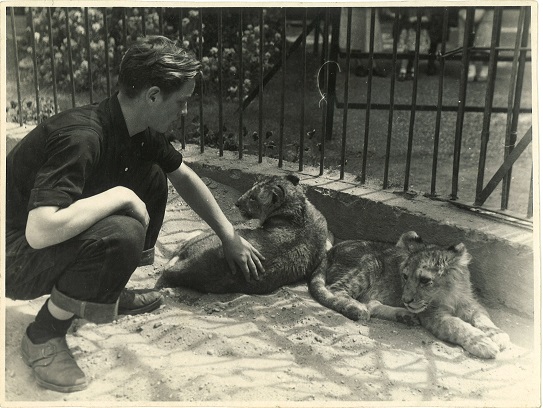
Above is a photo of the poet working at a zoo in Rhenen, The Netherlands in 1954
Leo Zoutewelle was born in 1935 in The Netherlands and was raised there until at age twenty he emigrated to the United States. After retiring in 2012 he has written an autobiography and two novels (unpublished).


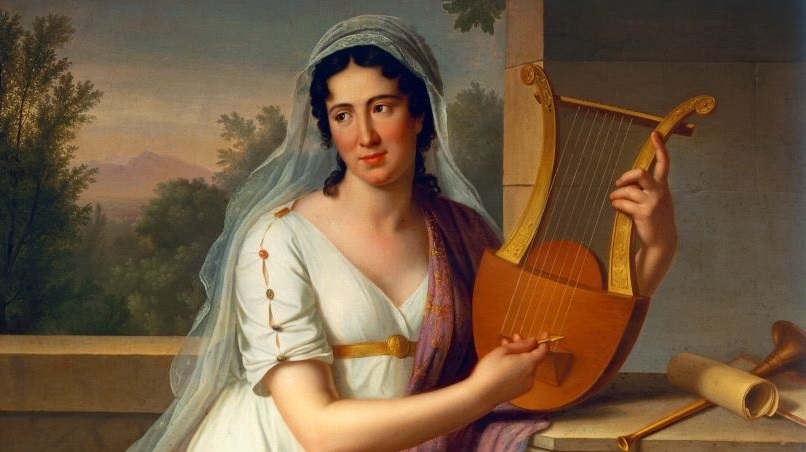

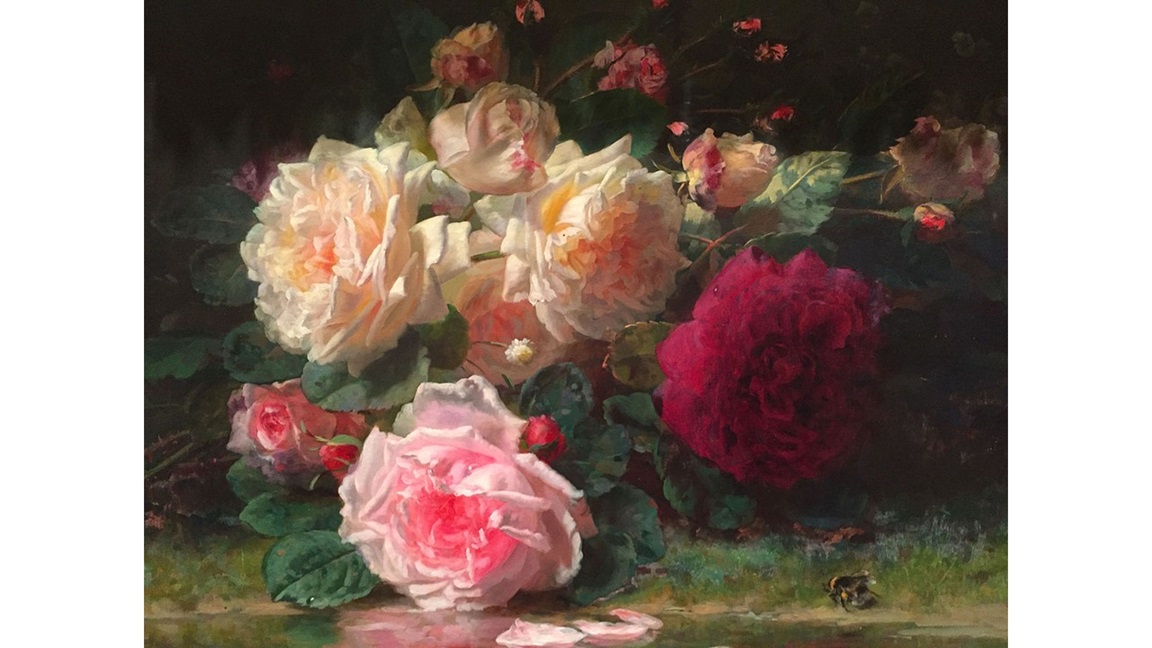


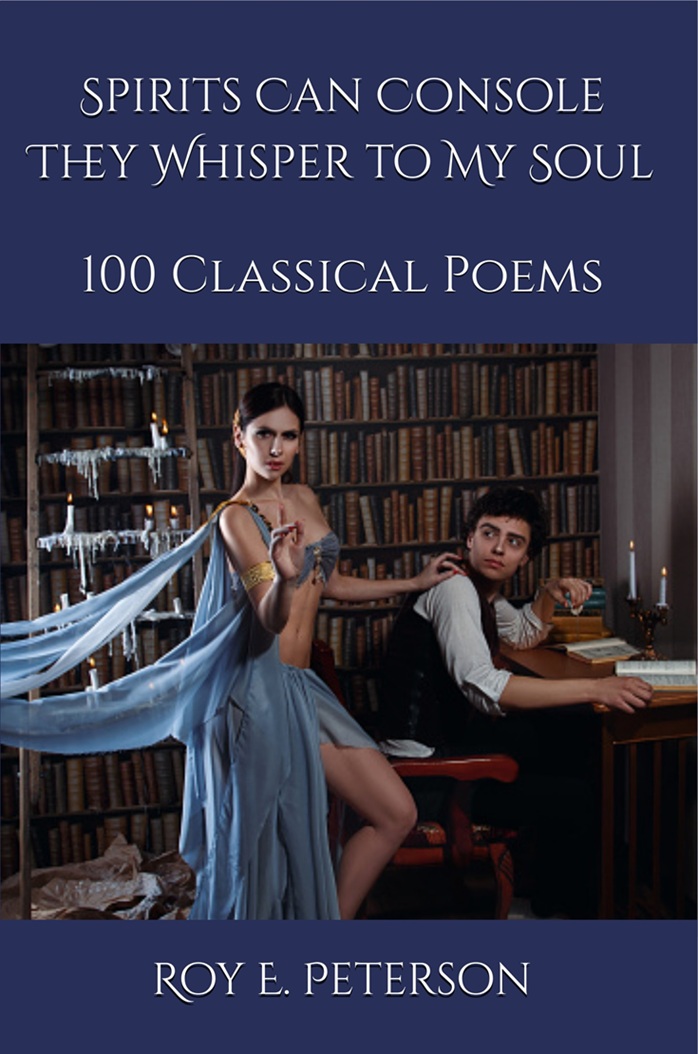





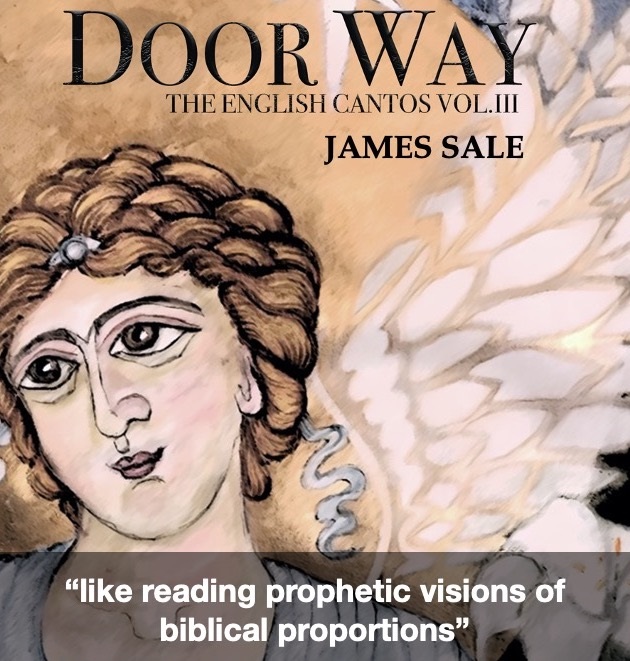



Dear Leo Sir.
Greetings!
All the poems are beautiful though the first one becomes my personal favourite.
Regards and best wishes.
Leo – Like Satyananda above I too found the first of these fine little poems the best, and there is nothing finer than the sound of the treble range. I think of Allegri’s “Miserere” but Palestrina and Monteverdi will do me just as well. It also makes a pleasant change to see a poem constructed in tercets. Well done!
Dear Peter, thank you for your encouragement. Not long ago I read that the high C(?) in Miserere was a copying mistake that Allegri did not intent, but it stuck anyway! Thanks again, Peter.
Leo
Dear Satyananda, thank you so much for your kind note. I much appreciate that!
Leo
Dear Leo —
You and I have different vocabularies and pronounciations, although we both speak English.
Nevertheless, we share a common interest – that of seeing around corners and into odd places. I always appreciate that when I see it.
That is an interesting way of looking at it and speaking about it! And, of course, Sally,I am grateful to you for your impressions and evaluations and always will be. Thank you!
Leo
Leo:
As a former classical soprano, I very much appreciated your first poem (though I enjoyed them all). I particularly liked “a treble’s voice will always tell/The vibrant heart: it does not take us long/To sing and reach the realm where angels dwell.” Lovely work!
Thank you for that, Teresa, that comment means a lot to me. I have an older sister who was a classical soprano and your comment brought back many memories from that time (Due to her age she has lost her lovely voice).
Thank you!
Leo
Leo,
Hi. I agree with the others that the first poem is beautiful, and I particularly enjoyed the sonics of its final line. However, my favorite poem is the fourth one, since I like poems about animals, and this poem has a great story.
Two other thoughts. In the first poem, I was expecting “as much” to be followed by another “as.” To me at least, lines 7 and 8 would make more sense if “as” were replaced by “so.” Although I might be missing what you’re trying to say in these two lines. Also, in the fourth poem, line 1 would flow better, to my ears, if “still” were deleted and the line began with a headless iamb, i.e.:
ONCE when I was YOUNG and CUR – i – OUS,
Thank you for sharing these well-crafted poems. Best wishes,
Mark
Hi Mark,
I do appreciate your thoughts! (especially about liking animals). About your two points, I grant you that your first line in the Elsa poem would be perfectly fine, but I still prefer what I had because the word “still” has the implication that I am no longer young and strong, a thought I wanted to be part of that poem. The other point about using “so” in place of ‘as” in the first poem, I don’t agree with, but, shockingly, for the life of me, I can’t tell you why. I just can’t verbalize, say it in words! So I’ll have to leave it with “as”. But I really appreciate your thoughtful remarks. All the best to you too!
Leo
I love the rhythmic structure of “A Treble’s Song”.
If you patterned it after “Stopping by a Woods”, I believe you surpassed it – a masterpiece of woven rhyme!
Dear Joe,
Wow, you flattered me with your comment! I think I blushed when I read your response, but you sure made my day. Oh, no, I did not think of Frost when I wrote it. Thank you so much for writing!
Leo
Leo, “A Treble’s Song” stands out for me, as it does for other readers. On reflection, I pin it down to the musical theme matching the musicality of verse. I also enjoyed the other three poems.
Thank you, David, for your reply. I tend to agree with your thought about the musical nature of the content strengthening the “musicality” of the text.
Thanks again! All the best,
Leo
“A Treble’s Song” was a nice bit of terza rima, though you left a rhyme hanging in air.
I found the diction and the thread of ideas in the second poem somewhat strained. “‘the-rival-won,’ and sense our fragile pathos much impaired,” is one example. Even W.B. Yeats, who allowed himself many liberties, would not have let this one pass.
The third poem, no matter howsoever much I admire the sentiments expressed therein, contains some very awkward expressions in standard English. “because/ with love our difference in kind amends.” just doesn’t make any sense. I could go on, but I’m sure that the general readership has had quite enough of me.
Hi C.B. Thank you for commenting. I am glad you speak your mind because I gain each time you do. After all, you have what, forty years experience and I am quite able to pick and choose at those times I don’t agree with your particular viewpoint. And so: many thanks and best wishes,
Leo
Some lovely lines and ideas in these poems, and there is that sense of wisdom garnered through age as we come, as we do, to the final mystery and try to understand what everything we have done means. Very touching work.
Thank you, James, for those kind and helpful words. They cheer me up with vigor!
With all best wishes,
Leo
Stay young Leo, and may the lion ever roar!
That line, James, I will remember always..
Thank you
Dear Mr. Zoutewelle,
I really like your poem about Elsa.
It’s very sweet and tender that animals and humans can and do sometimes establish a deeper connection.
Some animals are truly smarter than we take them for.
Thank you for sharing!
-Gleb
Dear Gleb,
I had been out of town a few days and I was glad to hear from you when I came back! I have read a few of your poems before. They have touched a certain string in me each time. We must be kindred spirits in some way.
Thank you so much for writing!
Leo
Dear Leo –
It speaks well for your compelling work to say that I have again returned to such thoughtful, sensitive poems; especially the one about your friend Elsa.
I have had some cats that can understand what I say. Not that they will always honor my requests; you know how independent they are. But, if in the mood, they will follow my instructions to the letter.
On one occasion, a recently deceased cat friend barked after his demise. Tes, they can sometimes learn barking.
A a few days after passing; another one appeared to me.
Strange? Well, yes, anything we don’t understand is always so, don’t you think?
Dear Sally
I was delighted to hear from you again – on a past submission at that! Well, indeed, what we don’t understand always seems strange, although in the case of cats (with their nine lives and all) I did not know what to make of it. Nevertheless, I don’t really know if animals have souls, but I do think that their creator (ours too) has given them specific jobs to do, different assignments, if you will, than were bestowed on us. That means that I think it quite possible that in many cases an inter-species contact between us can be established… who knows?